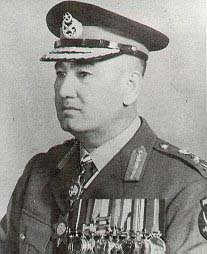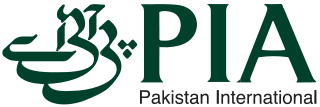This article needs additional citations for verification .(February 2024) |
| |||||
| Decades: | |||||
|---|---|---|---|---|---|
| See also: | |||||
Events from the year 1961 in Pakistan.
This article needs additional citations for verification .(February 2024) |
| |||||
| Decades: | |||||
|---|---|---|---|---|---|
| See also: | |||||
Events from the year 1961 in Pakistan.

East Pakistan was the eastern polity of The Islamic Republic of Pakistan, established in 1955 under the One Unit Policy, renaming and restructuring the province as such from East Bengal, which, in modern times, is split between India and Bangladesh. Its land borders were with India and Burma, with a coastline on the Bay of Bengal. East Pakistanis were popularly known as "Pakistani Bengalis"; to distinguish this region from India's state West Bengal, East Pakistan was known as "Pakistani Bengal". In 1971, East Pakistan became the newly independent state Bangladesh, which means "country of Bengal" or "country of Bengalis" in Bengali language.

Agha Muhammad Yahya Khan was a Pakistani military officer who served as the third president of Pakistan from 1969 to 1971. He also served as the Commander-in-Chief of the Pakistan Army from 1966 to 1971. Along with Tikka Khan, he is considered the chief architect of the 1971 Bangladesh genocide.
Muhammad Ayub Khan was a Pakistani military officer and politician who served as the second president of Pakistan from 1958 to 1969. He previously served as the third Commander-in-Chief of the Pakistan Army from 1951 to 1958.

The Pakistan Muslim League, is the name of several different Pakistani political parties that have dominated the centre-right platform in the country.

The National Awami Party (NAP), translated from Urdu to English as National People's Party, was the major left-wing political party in East and West Pakistan. It was founded in 1957 in Dhaka, erstwhile East Pakistan, by Abdul Hamid Khan Bhashani and Yar Mohammad Khan, through the merger of various leftist and progressive political groups in Pakistan. Commonly known as the NAP, it was a major opposition party to Pakistani military regimes for much of the late 1950s and mid-1960s. In 1967 the party split into two factions.

General Muhammad Musa Khan was a Pakistani senior military officer who served as the 4th Commander-in-Chief of Pakistan Army from 1958 to 1966, under president Ayub Khan. Following his tenure as C-in-C of the Army, he later became a politician.

Malik Amir Mohammad Khan was the Nawab of Kalabagh and a prominent feudal lord, politician, the chief or sardar of the Awan tribe, and of his tribal estate Kalabagh, in Mianwali District of north western Punjab, Pakistan.
Ayub Khan is a compound masculine name; Ayub is the Arabic version of the name of the Biblical figure Job, while Khan or Khaan is taken from the title used first by the Mongol rulers and then, in particular, their Islamic and Persian-influenced successors in South Asia, where the name is usually found, although Khan was being used before outside South Asia.

Pakistan International Airlines (PIA) cricket team was a first-class cricket side sponsored by the national flag carrier, Pakistan International Airlines (PIA), and was based in Karachi before its disestablishment in 2020. The side has won the Quaid-e-Azam Trophy more times than anyone else except Karachi.
Akhtar means "star" in Persian and is used in Pashto for Nowruz and Eid Day. It is also a common surname. A variant spelling is Akhter.
Mohammad Ayub may refer to:
The Constitution of 1962 was the fundamental law of Islamic Republic of Pakistan from 8 June 1962 until martial law was declared in 25th March 1969. It was abrogated on 25th March 1969 by President Yahya Khan.

Lieutenant General Wajid Ali Khan BurkiMB ChB DOMS MD FCPS FRCP FRCP (Edin) FRCP(G) LL.D. (Hon) MBE CBE H.S.P known as the Father of Medical Services in Pakistan, was both a distinguished ophthalmologist widely recognized as an expert in the field of eye care, doctor, agriculturist, diplomat, and author who was a high profile Pakistan Army Medical Corps general. Burki left a lasting legacy as the founder of the Armed Forces Pathological Laboratory, AFPGMI, Founding Chairman of the PM&DC, CPSP, and the National Health Laboratories. Furthermore, he was elected as the first president of the Ophthalmological Society of Pakistan and played a key role in co-founding Islamabad, the new capital city.
Shoaib is an Urdu Islamic male given name of Arabic origin, which to a much lesser extent is also used as a surname.
Pride of Performance is a civil award given by the Government of Pakistan to Pakistani citizens in recognition of distinguished merit in the fields of literature, arts, sports, medicine, or science.
Fakir Abdul Mannan was the former Minister of Agriculture of East Pakistan and lawyer.